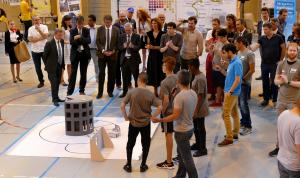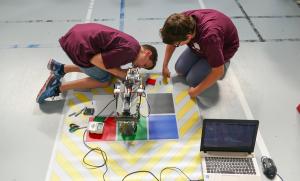ITER Robots 2018
Different scale, same spirit
28 May 2018
-
Shira Tabachnikoff
A strangely shaped vehicle, the size of a toaster, confidently trudges along a curved line until it reaches a bright blue tablet resembling a bar of soap. It lifts the module carefully and gently places it in the "workshop"—a container no larger than a shoe box. It then turns with purpose and heads dutifully back to the retrieve the next module, red this time.
This scene was repeated dozens of times on 24 May, as 64 teams (600 students) competed in the seventh annual ITER Robots contest in a high school gymnasium near ITER.
Students came together to compete in one of four challenges—each one requiring that a robot, made from scratch and programmed by the team—carry out an ITER-like robotic activity. Mimicking the bus-size remote handling containers that will operate inside of the Tokamak Building during the deuterium-tritium phase, the student robots had to follow precise trajectories ("Ways"), deliver "components" to the maintenance area ("Transport"), recognize the correct item to be transported ("Pick'n Place"), and master recognition and delivery tasks ("Cooperate"). The same skills that have been required for ITER's robotic systems—creative thinking, technical skills, tenacity, resourcefulness and imagination—were demonstrated by the students, who had worked six months to prepare.
Getting ready in the test zone for the Cooperate challenge with students from Collège Jean Bernard (Salon-de-Provence).
ITER Robots was conceived by Agence Iter France, and has been held annually since 2012 in partnership with Aix-Marseille academy, ITER Organization and the French Alternative Energies and Atomic Energy Commission (CEA); this year's event also received the support of local industry, with representatives from the Arianne Group, Cyclyum and Cyberia displaying their own robotic innovations.
The competition places some of ITER's technical challenges into a broader educational perspective by using a playful approach for students. It is open to junior high schools and to secondary schools that are located in Provence-Alpes-Côte d'Azur region; soon, a junior version for primary schools will be launched.
The anticipation is palpable. Will the robot succeed in the Transport challenge? (Collège Giono, Orange)
Jean-Pierre Martins, a remote handling engineer at ITER who was involved in the creation of the initial challenge and has served as president of the scientific jury, observed: "ITER Robots is in the spirit of what we will have to do at ITER. It is on a different scale, but it has the same objective: learning how to overcome first-of-kind challenges with creative ideas, a collaborative approach and good project management skills."
The robots created for the competition may seem like toys, but they should not be taken lightly. Their creators, their ideas and skills, will be needed to make the complex projects of the future a success. Congratulations to all the teams for their participation!
Click here to watch a video (in French) on the preparation of ITER Robots 2018.




